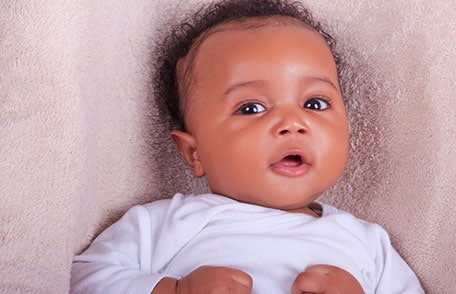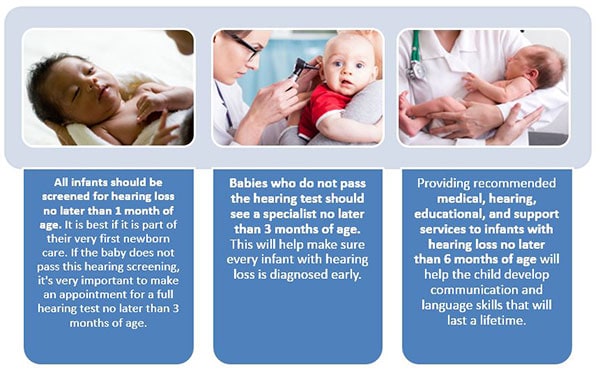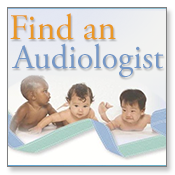Can your baby hear you say “I love you?”

The best way to find out if your baby may be deaf or hard of hearing is by a hearing screening. Early diagnosis and intervention will help them reach their full potential.
Thousands of babies are born deaf or hard of hearing each year in the United States. Babies diagnosed early with hearing loss and begin intervention early are more likely to reach their full potential. The best way to find out if your baby may be deaf or hard of hearing is by a simple hearing test, also called a hearing screening.
Why is a hearing screening important for my baby?
Learn more about outcomes associated with early hearing detection and intervention:
Reading Proficiency Trends Following Newborn Hearing Screening Implementation
Frequency of Early Intervention Sessions and Vocabulary Skills in Children with Hearing Loss
Starting from day 1, babies begin to learn language skills by listening to and interacting with those around them. If babies miss these opportunities, their language development can be delayed. Many times, children’s hearing loss is not obvious and can go unnoticed for months or even years.
Hearing screening at birth can determine if your baby may have a hearing loss and if more tests are needed. An early diagnosis is essential to help babies who are deaf or hard of hearing reach their full potential, and allows families to make decisions about the intervention services that are best for their baby’s needs. Early diagnosis of hearing loss and beginning intervention helps to keep children’s development on track and improve their future language and social development.
Your baby probably had a hearing screening
Almost all states, communities, and hospitals now screen newborns for hearing loss before the babies leave the hospital. The hearing screening is easy and painless, and it can determine if more testing is needed. In fact, many babies sleep through the hearing screening, and the test usually takes just a few minutes.
What if my baby did not pass the hearing screening?
Additional testing is the next step to tell if your baby has hearing loss and what type of loss it is. A healthcare professional trained to test hearing, such as an audiologist, will be able to perform more detailed hearing tests. Your baby’s doctor (or an ear, nose, and throat doctor) should perform or order any medical tests needed to find out the cause of the hearing loss.
Making sure your baby gets this additional testing quickly is also important. CDC-funded research shows just how important it is. Children with hearing loss who are identified before 3 months of age, and receive services before 6 months of age, have better vocabularies than those identified or receiving services later. For more information about this research, visit Giving Every Child the Gift of Words
If my baby passed the hearing screening, is everything fine?
Because a newborn baby can pass the hearing screening and still develop a hearing loss later, your baby’s doctor should routinely follow your baby’s general health and development.
For more information, visit CDC’s Early Hearing Detection and Intervention (EHDI) website.

View large image and text description
Where can I go for help?
Every state has a program that works to help make sure that babies who are deaf or hard of hearing are diagnosed early. If you have any concerns about your baby’s hearing, ask the doctor for a hearing test or screening as soon as possible. To learn more about this topic, you can also call toll free 1-800-CDC-INFO or visit the CDC EHDI Program site.
The Centers for Disease and Control and Prevention’s (CDC’s) Early Hearing Detection and Intervention (EHDI) program works with your state to ensure that all babies are screened for hearing loss and receive any needed follow-up tests and services. CDC’s EHDI program supports the ongoing search for new ways to improve services. To learn more about CDC’s important role in helping children who are deaf and hard of hearing, download a fact sheet [PDF – 384 KB, 2 Pages, 508] and watch a video in American Sign Language.
- Hearing Loss in Children
- A Parent’s Guide to Hearing Loss
- A Parent’s Guide to Genetics and Hearing Loss
- Educational Materials
- Listen to a podcast in English [PODCAST – 10:46 minutes] or in Spanish [PODCAST – 13:11] on Early Hearing Detection and Intervention
